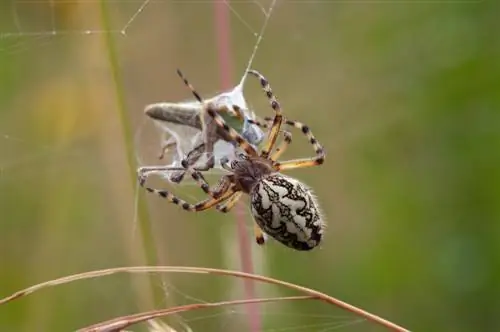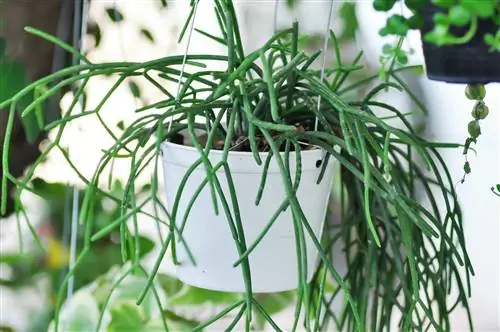- Author admin leonars@hobbygardeners.com.
- Public 2023-12-16 16:46.
- Last modified 2025-06-01 06:02.
Cross spiders live a life by a thread, artfully woven into impressive orb webs. This guide explains in detail and comprehensibly whether the lives of people and pets also hang in the balance after a spider bite. Read here whether a garden spider is poisonous or harmless.
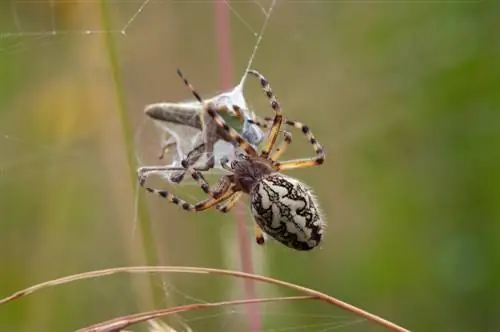
Is the garden spider dangerous?
Slightly poisonous, but completely harmless. This is the bottom line about the danger potential of a garden spider for humans. In fact, in the spider kingdom it is the rule that poisonous substances are used to hunt prey. Garden spiders always have a small supply with them in tiny poison claws in their toothless mouths. If an insect gets caught in the wheel-shaped net, it is injected with the paralyzing poison at lightning speed. The spider then quickly wraps its victim in spider silk in order to suck it out immediately or later.
What ends badly for a cross spider's prey has no serious consequences for humans. A direct confrontation only occurs if the orb-web spider cannot find a way to escape. During a bite attack, the garden spider has a hard time penetrating human skin with its very short poisonous claws. If it unfortunately hits delicate areas of skin, slight discomfort occurs, like after a harmless mosquito bite.
Slight swelling, redness and annoying itching will subside after a short time if the poisonous claws of a cross spider pierce the epidermis. In rare cases, systemic symptoms occur, such as headaches, nausea and muscle cramps. Stronger symptoms are of course an indication of an allergic reaction and require a clarifying appointment with your family doctor.

Excursus
Ground spiders - danger for allergy sufferers
Allergy sufferers should not take confrontation with insects lightly. In this regard, the garden spider is no exception, although its bite is generally considered harmless. If the smallest amounts of spider venom get under the skin, shortness of breath, circulatory problems and similar symptoms of allergic shock are inevitable. When working in the garden, long-sleeved clothing, rubber boots and work gloves for allergy sufferers are good protection against the bite of a garden spider. The personal emergency kit should always be at hand because it can save lives in an emergency.
Home remedies relieve cross spider bites
The bite of a garden spider is usually harmless. However, the attack can have unpleasant consequences for those affected. The more delicate the spider victim's skin, the more distressing symptoms appear. Adults experience symptoms similar to those experienced after a mosquito bite. In the worst cases, children and babies can experience local swelling and pain, even severe itching. The following home remedies relieve unpleasant side effects when a garden spider bites:
- clear water: Rinse the wound under running water
- Ice: Place ice cubes on the skin
- Onion slice: Cut the onion and press it on the bite wound
- cucumber slice: Cut the cucumber into slices and place on top
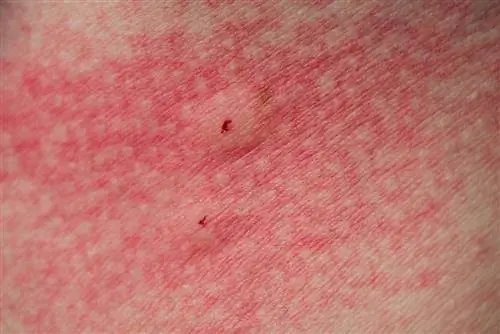
Spider bites should be cooled immediately if possible
As an immediate measure in the garden, grab a handful of cold, black soil and press the clod of soil onto the bite wound. To this day, dairymen and dairymen swear by this home remedy from the “dirty pharmacy” because they regularly encounter garden spiders on mountain pastures in the summer and are occasionally bitten.
Consult the doctor with babies and toddlers
Delicate baby skin can easily penetrate even the tiny poisonous claws of a garden spider. Correspondingly severe symptoms can occur after a spider bite. Furthermore, it has often not yet been established whether small children are allergic to spiders. If the initial symptoms have been alleviated with home remedies, we recommend consulting your pediatrician. Thick swelling, severe redness, restlessness, fever or even shortness of breath are not a case for self-medication in children.
Ground spider does not bite intentionally
Anyone who assumes evil intentions after a bite from the long-legged culprit is doing the harmless cross spider an injustice. In fact, all species only have the hunt for prey insects in mind. Under no circumstances do the spiders with the cross on their abdomen crawl after a person in order to bite them. If the involuntary confrontation is met with a bite, the garden spider feared for its life because all escape routes were blocked. Instead of hitting the arachnid or waving your hands in panic, you allow the shy insect to escape and are spared from a defensive bite.
Identify garden spider safely - profile
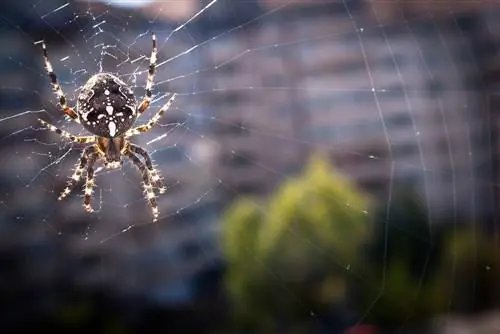
A garden spider can be easily recognized by the cross on its back
The unmistakable identifying feature of a garden spider is a cross made up of five spots on its abdomen. Four elongated blobs gather around a rounded mark in the middle. Other characteristics of the striking arachnids dispel any remaining doubts about their presence. The following profile sums up the attributes that characterize the local spider species:
- Insect family: Real orb-web spiders (Araneidae)
- Genus: Garden spiders (Araneus)
- Size: 5-18 mm
- Body coloring: depending on the species, black, light to dark brown, yellowish, reddish
- Occurrence: Europe, focus on Central Europe with 10 species
- Habitates: open landscape, gardens, orchards, pine forests, raised moors, hedges
- Food: Insects of all kinds
- Catch method: spider webs, bite and simultaneous injection of paralyzing poison
- Life expectancy: 3 to 4 years
- Status: not threatened with extinction
- Toxic to humans: slightly toxic, without serious potential danger
Apart from a short mating season in late summer, garden spiders prefer a solitary life. Males looking for a bride prefer to roam around rather than spin a web. However, both genders have mastered the art of spinning equally. Garden spiders build impressive orb webs to capture prey. Most of the time they sit patiently in the center of the ingenious catch design. Some species lay a signal thread to the net and register immediately when an insect becomes entangled in it using minimal vibrations. The alarmed garden spider quickly pounces on its catch and bites. The spider can also take on significantly larger prey because it has an advantage thanks to the paralyzing poison.
With their artfully woven orb webs, garden spiders put many human achievements to shame.
Cross spider species at a glance
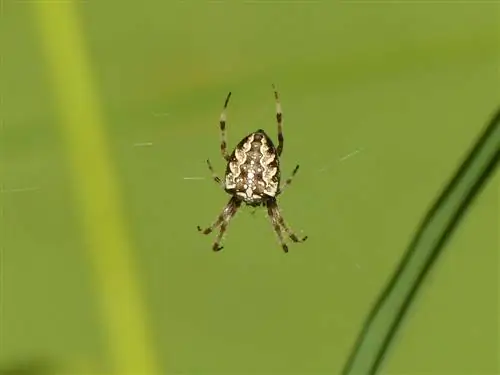
The four-spotted cross spider is just one of many species
Ground spiders are masters of adaptation. The widespread genus from the orb-web spider family has, over the course of evolution, produced a variety of species with individual characteristics, perfectly tailored to the local conditions in the habitat. The following table lists common cross spider species by name with information about special features:
| Name | scientific name | Common name | Size | special feature |
|---|---|---|---|---|
| Garden spider | Araneus diadematus | German garden spider | 7-15mm | variable coloring according to brightness |
| Fourspotted Cross Spider | Araneus quadratus | orange or yellow garden spider | 10-18mm | Cross of four spots |
| Horned Garden Spider | Araneus angulatus | spiny garden spider | 8-16mm | two humps on the abdomen |
| Swamp Garden Spider | Araneus alsine | red garden spider | 8-15mm | most colorful species |
| Marbled Garden Spider | Araneus marmoreus | white garden spider | 9-15mm | extra wide abdomen |
All cross spider species are characterized by a multi-faceted body color. Common names that refer to the color of the spider's body should therefore be treated with caution. The color of a garden spider adapts to the current incidence of light. Marbled garden spiders love variety and appear either in bright orange, elegant white or subtle grey.
Are garden spiders poisonous to pets?
Concerned pet owners can be given the all-clear regarding the poisonous danger of cross spiders. The shy insects only respond to a curious sniff from a dog or cat with a bite if escape routes are closed to them. This can be painful for your pet at first, combined with corresponding panic-like reactions, such as those seen after a wasp sting.
A toxic reaction is only to be feared on thin areas of skin. If a cross spider bites cats or dogs in the armpit or groin area, for example, temporary swelling and redness will occur around the bite wound. However, the symptoms go away within a short time. The cross spider bites a tiny wound cavity that quickly closes itself. There is no stinger left in the wound that could torment the animal, like after a bee or wasp sting. In other areas of the skin, the short poisonous claws of garden spiders and their relatives do not penetrate so deeply that the four-legged victims have to pay for it.
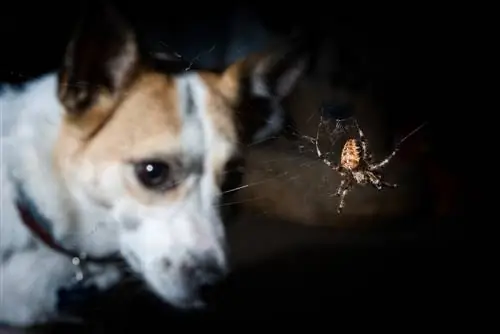
Pets and spiders rarely get in each other's way
Background
Ground spiders - welcome beneficial insects in the garden
The guest appearance of garden spiders in the garden makes the hearts of nature lovers beat faster. Where the shy arachnids settle, the ecological balance is in balance. Orb-web spiders diligently make their contribution to natural pest control in the bed. The menu includes a wide range of insects, including a number of pests and nuisances, such as aphids, flies and mosquitoes.
Get rid of garden spiders - How to do it with strategy
All pleas for garden spiders to be harmless beneficial insects fall on deaf ears when the long-legged fellows sneak into the house. Nobody wants to share their bedroom with these unwanted insects. Caring parents do not want to tolerate garden spiders bothering their children or the baby in the cradle. The prejudice-laden aversion to garden spiders in the house and apartment is of course no reason to combat the beneficial insects with chemical insecticides. Two simple tricks scare away the uninvited arachnids, never to be seen again:
Lights off
Light sources magically attract garden spiders because they hope to find fat prey there. For this reason, spiders are often found on lamps, on balconies, terraces and in winter gardens. From these locations, orb-web spiders sometimes stray into living spaces. As an effective defense against uninvited visitors, simply turn off the lights around the house. For this reason, no night lights should be on in the child's room, at least not in the immediate vicinity of the bed or crib.
Removing spider webs
Cross spiders are hardworking and persistent. If the insects like a location, they will settle there permanently. By removing the characteristic orb webs promptly, you strongly encourage the spiders to look for a new hunting ground away from the building. Persistence is crucial for the control strategy, because garden spiders weave a fresh web every night if necessary.
Classic home remedies for repelling insects are futile if you want to get rid of garden spiders in the house. What works wonders against mosquitoes leaves the frugal arachnids cold. Experts from the German Wildlife Foundation have found that garden spiders are extremely undemanding when it comes to scents and aromas. In a series of experiments, orb-web spiders calmly ate prey that had previously been dipped in vinegar or Epsom s alt.
Frequently asked questions
Are garden spiders poisonous to humans?
Every garden spider has poisonous substances in its luggage for hunting prey. This fact cannot be denied and is the source of numerous myths and legends about the potential danger. In fact, the amounts of poison are far too small to harm people or pets. Furthermore, the arachnids' poisonous claws are too short and weak to penetrate human skin. All in all, it should be noted that garden spiders are harmless. In the worst case, a bite causes symptoms similar to those of a mosquito or wasp bite.
A garden spider bit me while I was working in the garden - what should I do?
Do not scratch the bite wound to prevent bacteria from entering and causing an infection. If there is no doubt that it is a cross spider, disinfect the wound with iodine, apply a plaster and you can confidently get back to business as usual. You can relieve slight swelling or itching with a cooling pad or ice cubes. However, are you unsure whether the culprit was actually a harmless garden spider? Then please see your family doctor. Ideally, you should catch the long-legged culprit or at least take a photo for clear identification.
I discovered a garden spider in my apartment. How do I get rid of the spider?
When temperatures drop in autumn, many species of spiders look for safe winter quarters. Human dwellings are also very popular with garden spiders because fat prey in the form of house flies and mosquitoes can be expected here. If you don't want to tolerate the long-legged roommates in your apartment, we recommend catching the useful insect eaters with a glass. Place a standard drinking glass over the uninvited guest. Now slowly slide a piece of cardboard under the glass. Then carry the spider outside and release it into freedom.
Are garden spiders poisonous to dogs?
Cross spiders inject their prey with a paralyzing poison that is specifically tailored to flies, wasps and other insects. The toxin poses no serious threat to mammals such as dogs and cats. Apart from that, garden spiders seek safety by fleeing when a dog approaches. If the spider bites in its distress and hits a delicate area of skin, in the worst case scenario, slight swelling, redness and itching will occur. You can relieve itching with cold compresses and a hydrocortisone cream.
We discovered several garden spiders on and in the house. How do we get rid of the spiders without killing the animals?
Ground spiders generally do not seek proximity to people. In contrast to house and trembling spiders, the insects usually only get into the building by accident. This is always the case when outdoor lighting attracts hordes of prey from a garden spider. If you don't turn on the lights in the house for a while, the location becomes uninteresting for the long-legged hunters. You should remove the distinctive orb webs regularly to scare away the annoyed garden spiders. Classic home remedies, such as essential scents or vinegar, have proven to be useless in practice.
Where do garden spiders most often stay?
The diverse family of cross spiders inhabits almost all habitats that Mother Nature has to offer in Europe. As the name suggests, the garden spider prefers to live in gardens and parks. In the forest there are good chances of meeting the horned garden spider. Wet meadows are the territory of the four-spotted garden spider. The red garden spider loves moist layers of herbs in fields, meadows and forests. The giant cross spider is currently native to dry, hot regions on the Mediterranean. However, the majestic cross spider species is on its way north as a result of global warming and has already been spotted in Austria.
Do the large orb webs always come from a garden spider?
Cross spiders are just one of twenty-five genera in the family of real orb-web spiders. The family is represented by more than 160 genera worldwide. An orb-web cobweb can only be assigned to a cross spider if the insect resides in it. Otherwise, the builder could also be a pumpkin spider (Araniella), bridge spider (Larinioides) or heath orb spider (Cercidia). Last but not least, numerous species of web spiders (Tetragnathidae) have mastered the art of spinning extensive orb webs. In order to correctly identify an orb web without a spider, even experienced arachnologists reach their limits.
Is the garden spider threatened with extinction?
Of the approximately 10 species of cross spiders native to Central Europe, the swamp cross spider (red cross spider, strawberry cross spider) is currently considered the only species seriously threatened with extinction. Reckless use of pesticides, destruction of biotopes and natural retreats are nevertheless intensifying the fight for survival for all cross spider species. In 2010, the garden spider was named Spider of the Year to draw attention to the increasing threats to its habitats.
Tip
With its masterfully woven webs, the garden spider puts human achievements to shame. One of their ingenious wheel nets consists of silk threads up to 20 meters long, which stretch three times as much without breaking. Based on their weight, spider threads are four times stronger than steel. In less than an hour, the garden spider spins its round web to capture its prey. Please consider these stunning features before destroying a garden spider web.

